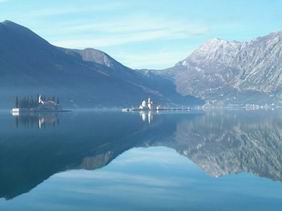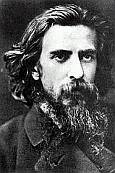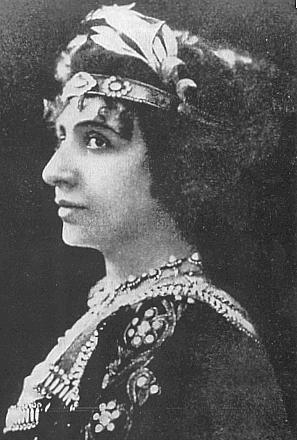
Sponsored Ads
|
| Croatia - Russia, historical and cultural relations |
| By Prof.Dr. Darko Zubrinic |
Published
06/27/2008
|
History , Culture And Arts
|
Unrated
|
|
|
|
Literature, art, music, sports,...
It will be interesting for Russian readers to know that the earliest monument built in honour of the famous writer L.N. Tolstoy (1828-1910) was erected not in Yasnaya Polyana, but in Selca (1911, a year after his death), a small and lovely town on the island of Brac, which has a great tradition in stonemasonry. 
Aleksandar Antoljevic Zvjagin, outstanding Russian painter living in Croatia, created beautiful masterpieces for Croatian churches and convents both in Croatia and in Bosnia - Herzegovina. See for example his St Francis taming a wolf, kept in front of the famous Franciscan convent on the islet of Kosljun near the island of Krk. Source: www.croatianhistory.net
|
Ivan Mane Jarnovic (1740-1804) was an outstanding Croatian violinist and composer of the 18th century, probably from Dubrovnik. He had a true European career - playing, composing and conducting in France (Paris), Austria, Germany, Switzerland, Poland, Scandinavian countries, England. Also played the first violin in the orchestra of the Russian empress Katarina II. Jarnovic composed about 50 chamber instrumental pieces, 22 violin concerts (17 preserved), and is known for having introduced the romanza as a slow movement into the structure of the violin concert. His life is described in a novel Jarnowick by G. Desnoisterres - Le Brisoys, Paris 1844, and in a collection Scènes de la vie d'artiste by P. Smith (Une leçon de Jarnovic, Paris, 1844).
Source: www.croatianhistory.net
|
The Bokelj's had a very strong fleet, which counted as many as 300 ships in the 18th century. Boka was a rival to Dubrovnik and Venice. It is worth mentioning that one of the Bokeljs - Matej Zmajevic or Matija Zmajevic (1680-1735) - was the admiral of Baltic navy and the ship-builder of the famous Russian tsar Peter I the Great, and for whom he built a fleet in Voronez. Matej Zmajevic had great successes in maritime battles against Sweden, and for this reason he was decorated with the order of Aleksandar Nevski. Zmajevic was buried with greatest military honours in the Catholic church in Moscow. Peter the Great sent some of his young officers (bolyars) to the town of Perast in Boka in order to study maritime sciences there.
It is interesting that Tripun Kotoran, a Kotor goldsmith, worked on the court of Ivan Grozny in Moscow in 1476. One of the earliest Croatian typographers was Andrija Paltasic (~1450-1500), born in the town of Kotor. He was one of the best Venetian typographers around 1480, who printed more than 40 incunabula, among them the Bible in Italian language. We also mention by the way that a very old missal from 12th century - the Kotor missal, is held in St. Petersburg, Russia.  When a Russian travel-writer P.A. Tolstoy visited Boka in 1698, he noted that the local hills are also inhabited by the Croats. Source: www.croatianhistory.net
|
A Croatian Dominican priest Beniamin was editor in chief of the first Russian Bible (finished in 1499) written in Russian Church Slavonic. It was the first Bible also among all Orthodox Christian Slavs. It served as a basis of later printed Russian editions in 1580-81 and 1663, which had spread among Orthodox Christian Slavs. Beniamin's original translations of the Vulgata are even today left unchanged in many parts of the contemporary Russian Bible. It is interesting that the old Russian Bible has many Croatian characteristics in phonetics, morphology and vocabulary, for example, - kovac (blacksmith)
- loviti (to hunt)
- plijen (prey)
- staja (stable)
- stijena (rock)
- nastojati (to strive)
- puk (common people)
- obitelj (family)
- and even - gusterna (stone water cistern)!
It is clear that he originates from the coastal region of Croatia, probably from the city of Split (according to Vladimir Rozov), and according to Franjo Sanjek, from the Glagolitic environment in the area of Rijeka, Vinodol or Lika. According to the famous Russian church historian Makarij, Beniamin was the chief personality in the creation of Genadij's Bible. This undertaking was of great importance for the Russian Church, in particular for the development of Russian spiritual literature. Beniamin also translated the 8th part of the latest 1486 Strasbourg edition of the famous work Rationale divinorum officiorum of Guilelemus Durandus - Spectator, which was devoted to calendar calculations and astronomy. In this way Beniamin influenced also the development of Russian astronomical terminology, in particular - Russian names for star constellations. According to Vladimir Rozov (Russian emigrant in Zagreb), Beniamin (or Venjamin as he is called in the Russian literature) represents the earliest humanist on the Russian soil, and furthermore, Beniamin was actually editor in chief of the first complete Church-Slavonic Bible among Pravoslav Slavs. Beniamin also had important role in opening new schools in Novgorod (until that time there were no real schools in Russia). The name of Croatian Dominican Beniamin is completely unknown among Croats in time when these lines are written (1999), except to several specialists. The Croats can be rightfully proud of this little known person for his great Ecumenical role. Beniamin's mission in Russia represents an important and almost forgotten bridge between Catholic and Orthodox Christianity.
Literature: - Vladimir Rozov: Hrvatski dominikanac Venjamin u Rusiji, Nastavni vjesnik, knj. 41, sv. 8-10, Zagreb, 1933, 302-336. See also here.
Vladimir Alekseevic Rozov (1876-1940), born in Kyiv, capital of Ukraine, in the family of professor of the Kyiv Spiritual Academy. In 1903 graduated from the Kyiv University (Faculty of Philosophy). In 1907-1908 investigated the Slavic manuscripts on the Near East. Professor of Slavic philology in the Nizyn Institute (1916) in Ukraine. Professor at the University of Tavrid (1918-1920; Tavrid is today's Herson in Ukraine). Lectured Russian language at the University of Zagreb (1920-1940), and died in Zagreb. Literary critic, culturologist, publicist, investigator of Russian-Croatian relations, author of many articles. [more]. Many thanks to Mr. Oleh Hirnyk, Lviv, Ukraine, for kind help. - Zarko Dadic: O hrvatskom dominikancu Benjaminu i njegovoj ulozi na dvoru novgorodskog arhiepiskopa Genadija, Croatica christiana, XIII, (1989) 23, str. 44-48.
- an article by academician Zarko Dadic
- Franjo Sanjek: Dominikanci u Rijeci i Hrvatskom primorju, Sveti Vid VIII, zbornik, Izdavacki centar Rijeka 2003.
Source: www.croatianhistory.net
A Croatian theologist, ecumenist panslavist and musicologist Juraj Krizanic (1618-1683) was trying to initiate the dialog on the unification of the Russian Church with Rome. He dreamed about an open and peaceful dialog with Orthodox Christians. His major works are "Politika" (in Russian), written during his 15 year exile to Siberia and the panslavic grammatical book "Gramaticcno iskazanie ob ruskom jaziku" (Tobolsk, 1665), as well as "Razgovory ob vladatelstvu", written in panslavic Esperanto that he invented. He also spent some time in Ukraine, where he had close ties with some of leading scholars. Krizanic wrote "Historia de Siberia" in 1680, with dedication to Jan Sobiesky. It is known that during his sojourn in Rome he supervised a publication of musical works of the Portuguese king D. João IV. According to Krizanic's systematization of science, music should be regarded as a part of mathematics. He wrote his "Asserta musicalia nova" in 1650. Krizanic died near Vienna while participating in its defence against the Turks in the Ukrainian troops that adjoined the troops of the Polish king Jan Sobiesky. According to a Russian historian S.M. Solovev (see his Istorija Rosii s drevnejshih vremen, vol. XIII, Sanktpeterburg 1868), Krizanic's book Razgovory ob vladatel'stve (Discussion about Governement) served as a handbook to Peter the Great, founder of the modern Russian state. Source: www.croatianhistory.net
Vladimir Solovev (or Soloviev, Solovjov, correct reading: Solovyov, 1853-1900), outstanding Russian humanist, religious philosopher and poet, spent a part of his life in Croatia, with Croatian bishop Josip Juraj Strossmayer and in Zagreb. In Zagreb Soloviev published his book Istoriya i budushchnost' teokratii (The History and future of Theocracy) in 1886, the first volume of projected (but never completed) three volume work. Let us cite a part of a speech of Pope John Paul II (1 September 1996): For him the very basis of culture was recognition of the unconditional existence of others. Hence his rejection of a monolithic type of cultural universalism, incapable of respecting and accepting civilization's many different expressions. He was consistent with this view even when he became an ardent, impassioned prophet of ecumenism, doing all in his power for reunification between Orthodoxy and Catholicism.  It is certainly interesting to mention here (especially for the Russian reader) that according to dr. Vladimir Rozov the first humanist on Russian soil was a Croatian Dominican Beniamin, who had important role in the preparation of the first Russian Bible (Genadij's Bible) by the end of 15th century.
Source: www.croatianhistory.net
|
Illma de Murska (born as Ema Puksec in the town of Ogulin, 1834 - 1889) was an opera diva of international fame. She sang in Italy, Spain, Hungary, and her most fruitful period was in Vienna, Austria. She also sang in Berlin, Hamburg, Paris and London, and had tours in Australia, Russia, USA and New Zealand. In St. Petersburg she was singing at the Court and the Russian Czarina crowned her with a brilliant diadem (see here for more details).  During a short period she was lecturing at the Conservatory in New York. The prima donna Ilma di Murska on the London stage
Milka Trnina (or Ternina, 1863-1941); according to Giacomo Puccini, author of the famous opera Tosca, she was the best "Tosca" that he had opportunity to listen to (on the London première in 1900); see Milka Ternina at the Royal Opera House, Covent Garden; only in Convent Garden in London Milka had 56 performances between 1895 and 1906. Also, she was the first Tosca in Great Britain and in the United States.  She sang at the ceremony of coronation of the Russian Tsar Nikolai II. One of the waterfalls of the Plitivice Lakes (a famous National Park in Croatia) is named after Trnina in 1898. For more information see the following monograph: Nada Premerl: Milka Ternina and the Royal Opera House (in English and Croatian), Muzej Grada Zagreba, Zagreb 2006. ISBN 953-6942-24-0 1898 Charter from the Croatian National Theatre in Zagreb conferring honorary membership to Milka Trnina (source [Premerl, p 86]), containing the Croatian Coat of Arms Did You know that the name of the famous MILKA chocolate, Switzerland, had been given in honour to Milka Trnina, Croatian opera diva?
Saviez vous que le célébre chocolat porte le nom de "Milka" en l'honneur de Milka Trnina, chanteuse d'opéra originaire d'Ivanic Grad en Croatie. Le fondateur de la marque étant un admirateur de la diva croate, il décida de donner son nom, Milka, a son entreprise et son chocolat. 
For more information see Croatia - Russia.
|
Formated for CROWN by prof.dr. Darko ®ubriniæ
Distributed by www.Croatia.org . This message is intended for Croatian Associations/Institutions and their Friends in Croatia and in the World. The opinions/articles expressed on this list do not reflect personal opinions of the moderator. If the reader of this message is not the intended recipient, please delete or destroy all copies of this communication and please, let us know!
|
|
|